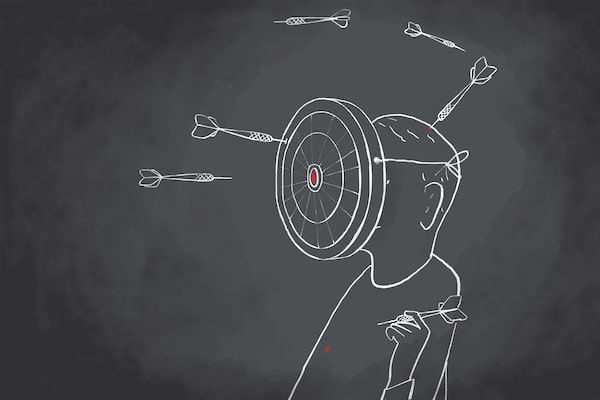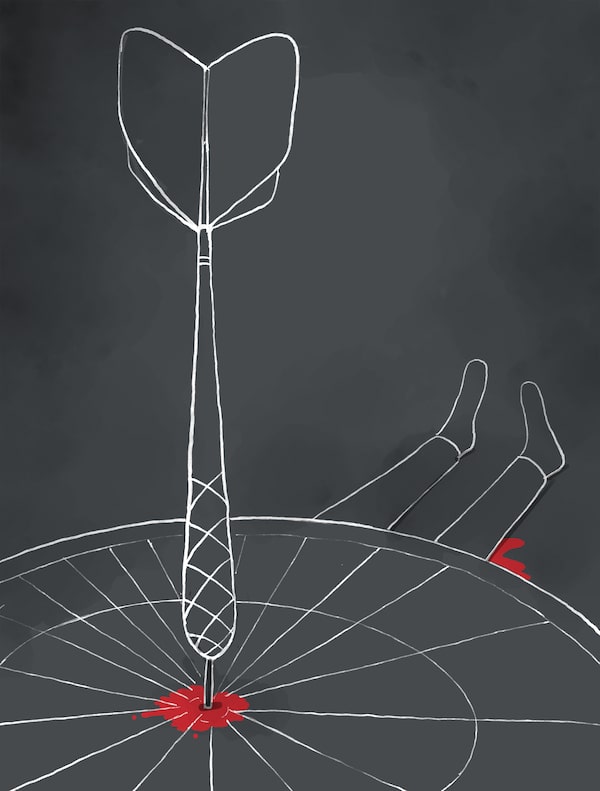
ILLUSTRATION BY GRAHAM ROUMIEU
Mark Kingwell’s latest book is On Risk.
“Everybody has a plan until they get hit,” boxer Mike Tyson said. “Then, like a rat, they stop in fear and freeze.” The stocky pugilist took to biting ears rather than punching them as his singular career wound down, but his comprehensive wisdom must be acknowledged. When life throws punches, plans fold, and bites start to look good.
We’ve all been punched in the face this past year, and our best laid plans have gone sideways. I hope we’re not resorting to biting. But as we shift from cancelled Thanksgivings and forced online classes to a discontented winter of new closings and maybe lockdowns, we have to pause and reflect on how we think about risk and our relationship to it.
Planning is never about our own levels of personal tolerance. Risk always has ethical and political implications. You may enjoy extreme sports that court physical danger, or bet on unlikely startup companies and low-probability poker hands, partly for the thrill and partly for the rush of potential success. You may just walk into traffic for the fun of it. Winning against the odds is perhaps the best feeling humans are party to, when venture and likelihood collide to resounding effect.
Taking chances is thus both the best and the worst of human behaviour. Without risk takers among us, we’d dwindle and die in complacency and settled ways. But too much confidence takes the basic quality of boldness, as Aristotle said, from the lack we call timidity to the extreme we condemn as rashness. As ever, hitting the mean is everything: Courage is a matter of knowing when and how to take chances, especially when we’re afraid to.
De l’audace, encore l’audace, toujours l’audace – “audacity, more audacity, and ever more audacity” – is a slogan that may sound good on the eve of battle, or at a singles bar, especially when articulated by Frederick the Great, Napoleon, George Patton or your bro-wingman. But when you get kicked around at Kunersdorf, Waterloo, Fort Driant, or, I don’t know, Hooters, it can just look dumb. Field marshal Helmuth von Moltke, in a more sober tactical vein, said this: “No battle plan survives contact with the enemy.”
The current enemy is everywhere; there are no fixed lines of battle. As the weather warmed this summer, we sought a return to the breezy hinterland of 2019. Many shopped, gathered, exercised, worshipped and travelled as if nothing had really changed. Some people even denied there was any risk out there. The pandemic was fake news, or it would somehow be over by November, or it was a blessing that could be survived like the common cold or a mild bout of influenza.
That last delusion is in fact a symptom of affluenza: the non-physical disease that afflicts people with more money (and so more tests, drugs and resources) than sense. The pandemic is still undeniably upon us, statistically getting worse since August. Our own failure to understand risk is now itself a risk factor in public health.
Four structural things to note. First, humans are bad at assessing chances. From air travel or swimming with sharks to home improvements or lottery tickets, we mostly have a poor grasp of probability. This is not surprising: We’re bad at a lot of other basically rational things, too, such as logic in arguments or calculating our own economic self-interest. So we overestimate some fears and dangerously underestimate others. We’re not smart.
Second, we’re bad at translating even good risk assessment into good action. You may know and even admit that it is silly to buy a lottery ticket or light an open backyard fire pit, but then do it anyway. Or you may reliably buckle up in the car, but then disdain a safety harness while cleaning out the gutters on your roof, or fail to bend your knees while shovelling snow. You buy insurance but then forget to renew the premiums. The list goes on.
Third, risk tolerance and risk aversion are randomly distributed across human populations. Furthermore, this distribution varies with circumstance. Everyone accepts some risk – you have to, if you want to get out of bed in the morning – but not everyone has the same baselines for acceptable danger at any given time. (Getting out of bed is already chancy; going to the bathroom or into the kitchen is much worse.)
Fourth, there is a natural tendency to minimize all risk when it suits us. We put ourselves at the centre of the equation, forgetting or ignoring that our risky behaviour poses a threat to others, our kids or neighbours. Call that the individualist premium, which everyone pays no matter what.
And so, not wearing a mask during a pandemic shifts from being akin to riding a bike without a helmet (personal risk tolerance) to driving while drunk (collective risk aversion). You’re no longer a bold individualist, you’re a potential superspreader. Your cool-boy stunt is now revealed as reckless, possibly criminal, endangerment. Stuff that hated mask into your pocket if you want to, salute the helicopter repeatedly on cue, and later claim immunity, but you still have the infection. To spread it is your choice, not the virus’s.
Nine months of pandemic protocols have made us more risk tolerant, mostly because people are selfish and their ability to curb their desires is limited. This is not sustainable. You see a packed, mask-free college football game on television, or a political assembly, or a motorcycle rally, and you wouldn’t know that there were more than one million people dead worldwide of a disease that spreads through airborne particles and sustained proximity. Magical thinking hardly covers it; this is willful stupidity.
Nobody would choose to be a medical officer of health right now. Any error made in the past nine months, unlike the dozens made daily by others, will be repeated as if tattooed on the flesh like the prisoners in Kafka’s penal colony. Every conclusion based on the good science of the moment will be mocked as if proffered drunkenly over the Sunday dinner table.
We will refuse and revolt, acting out and acting up. But please remember that this is not about what you personally can hack. Black, Indigenous, poor and elderly people are all bearing more lethal weight during this pandemic. Your insistence that life should go on as before, your personal freedoms respected, your face unencumbered, might well spell death to someone else. That’s not epidemiology, it’s politics; that’s not misfortune, it’s injustice.
As the fall continues, politicians and public health officials will be even more pressed when dealing with a public that is willing to take more risk if it means seeing a romantic partner, going to work, keeping a business open, or sending a child to school – the things people don’t want to give up and that bring their own harms if shut down. We can clamp down on gyms and indoor dining, but can we police the human soul?
That question is as old as Plato and Lao-tzu, and the only reliable answer is: No, we can’t. Humans are by nature unruly. Health, like all aspects of the moral universe, only works when individuals self-govern in a way that meshes personal goals with collective ones. Punishment deters, but only for those willing to be deterred. Heavy regulation is resented, oversight called out as paternalism.
But a twisted logic operating here is worth thinking over. The person who would not dream of running a red light at a lonely intersection in the middle of the night will refuse to wear a mask out of some half-baked theory of epidemiology that they heard yesterday on Twitter or talk radio.
There aren’t enough safety drills or contingency plans in the world to forestall every possible accident. Ben Stiller’s character in The Royal Tenenbaums makes the point, track-suited and hamstrung by his desire to prevent anything bad happening to his children. Life is risk. Mortality is the horizon of life as we know it. Nothing is going to change that.
But here on Planet Earth, contingency is all about assessment, not elimination. That’s why we buckle up, lock the front door, wear warm coats and look both ways before crossing the road. These precautions, which any sane person takes, won’t stop you or anyone else from getting snuffed if your number comes up – but they’re always worth doing just the same.
Set your risk dial to six, nine and 12: another half-dozen months of constrained life for certain, nine likely, and 12 possible. Call it Winter Plan D. Stay the course. Be at home if you can, put on a mask if you can’t. Wash your hands. Tip well when you can afford it. Support front-line workers and local business. Don’t hoard. Be patient as well as brave. None of these things will kill you, but not doing them might just kill somebody else. And don’t punch anybody in the face. There’s enough of that happening already.

ILLUSTRATION BY GRAHAM ROUMIEU
Keep your Opinions sharp and informed. Get the Opinion newsletter. Sign up today.